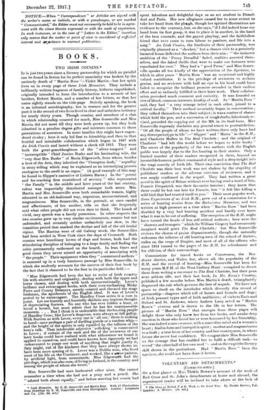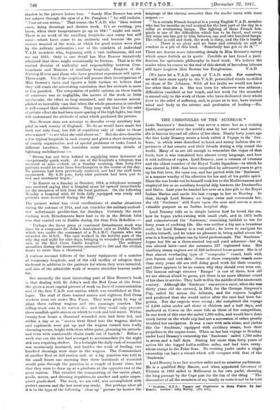VOLUNTARY All) DETACHMENTS.* Leommuthsceszol Ox a first glance at Mian
Thekla Bowser's account of the work of Red Cross and St. John's detachments at home and abroad, the experienced reader will be inclined to take alarm at the lack of
_ ....
• The Story of British r.e.a, Work in the Great War. Ttcklo Dosser, F.I. Loudon: A. Melrose. Os. set,/
shadow in the picture before him. " Surely Miss Bowser hoe seen her eubjeot through the eyes of a Dr. Pangloss I " he will exclaim. "Tout oat max miens." That terror, the V.A.D. who "likes serious cases, doing dressings and theatre work. It's so exciting, you know, when their temperatures go up to 104 ! " might not exist. There is no word of the auxiliary hospitals—not many but still some—which have oome to an untimely end because the pro- moters wearied of the work, or which for good reason were shut by the military authorities ; nor of the numbers of individual V.A.D. members who, beginning with a vest enthusiasm, did not see out 1915. Only in one detail has Miss Bowser tentatively admitted that there might occasionally be friction. That is in the mutual division of authority and responsibility between Com- mandants and Matrons of auxiliary hospitals. Readers of the Nursing Mirror and those who have practical experience will agree- There might. Yet if the sceptical will pursue their investigations of Miss lloweer'a facts and figures a little further we believe that they will roach the astonishing conclusion that her attitude is more or leas justified. The compulsion of public opinion on these bands of amateurs was so negligible, the nature of the work so little spectacular, the effort as long sustained, and the amount accom- plished so incredibly vast that when the whole panorama is unrolled it will compel their admiration. They may wish that for the sake of artistic effect she had been more sparing of the high lights, but they will understand the attitude of mind which produced the picture.
Miss Bowser does not attempt to describe every auxiliary hos- pital in each county of England. To do so would have made her book not only long, but full of repetition only of value to those who wanted " to see what she said about us." But she does describe a few typical hospitals in each county and gives a short description of county organization and of special problems or tasks found in different localities. She furnishes some interesting details of lightning mobilizations :- " Devon has not been behind in supplying some instances of exceptionally quick work. At one of the hospitals a telegram was received at nine o'clock on a Sunday morning, that forty-five
patients would be sent from Southampton in tho course of the day. No patients had been previously received, nor had the staff been summoned. By 4.30 p.m. forty-nine patients had been put to bed and treatment begun."
" At Exeter on a Sunday in October, 1914, a telephone message W89 received saying that a hospital must be opened immediately for the reception of sick from the local garrison. On the following Monday a hospital with 80 beds fully equipped was ready and patients wore received during the day."
Tho present writer has vivid recollections of similar situations during the autumn of 1014, and can vouch for the military authori- ties' unfortunate predilection for Sundays. Certainly the most exciting work Detachments have had to do in the British Isles was that carried out in Dublin during the Sinn Fein Rebellion
Perhaps the finest piece of combined Detachment work was done by a composite St. John's Ambulance unit at Dublin Castle which was under the command of a R.A.M.C. Captain who was awarded the D.S.O. The unit worked in the hottest part of the city day and night for nine days, bringing in wounded in armoured cars to the Red Cross Castle hospital. . . . The military casualties during the insurrection amounted to 500 and the civilian losses to more than a thousand."
A curious account follows of the hasty equipment of a number of temporary hospitals, and of the odd medley of refugees they sheltered in addition to the patients for whom they were intended, and also of the admirable work of women stretcher-bearers under fire.
But naturally the most interesting part of Miss Bowser's book is that dealing with St. John's and the Red Cross at the front. She gives a most capital picture of work on linos of communication and of the first V.A.D. rest station which was established at Bou- logne. The staff of three trained nurses and eighteen Red Cross workers went out under Mrs. Fume. They were given by way of plant three railway wagons and two passenger coaches. The rolling-stock was in its native di., and they could only procure three smallish spirit-stoves on which to cook and boil water. Within twenty-four hours a thousand wounded men had been fed, and within a day or so " stoves were fitted into the wagons, shelves and cupboards were put up and the wagons turned into really charming rooms, bright with clean white paint, gleaming tin utenails, and even with comfortable chairs made out of barrels." Before a week was out the unit had arranged to accommodate for the night sick men requiring shelter. In a fortnight the daily rush of wounded was enormously increased, and besides the work of feeding, two hundred dressings were done in the wagons. The Commandant of another Rest or Aid station unit at a big junction was told in the small hours one morning that three trainloads of wounded would pass through the junction in a couple of hours' time, but that they were to draw up at a platform at the opposite end of the great station. This entailed the transporting of the entire plant, goods, stoves, and dressing requisites, to another and quite unpre- pared goods-shed. The work, we are told, was accomplished with perfect mamas and the hot meal was ready. But perhaps after all it is to the typo of the following close up " picture (to borrow the language of the cinema scenario) that the reader turns with most respect :— " In a certain French hospital is a young English V.A.D. member who has for months on end worked for the best part of the day in a cellar at retrimming lamps. The lighting of these French hos- pitals is one of the difficulties which has to be faced, and every day some one has got to trim between one and two hundred lamps. The cellar is cold and dark, the work is dirty, and the life is lonely. . . . There is no glory and no fame and certainly no sort of comfort in a job of this kind. ` Somebody has got to do it.' " There are dozens more interesting details in Miss Bowser's survey which apace forbids us to quote. Candid@ at last found a justi- fication for optimistic philosophy in hard work. We believe the reader when he comes to the end of this sketch of herculean labours will have forgiven Miss Bowser her Pangloasism. V.A.D.
[We have let a V.A.D. speak of V.A.D. work. For ourselves, we will once more apply to the V.A.D. personified words modelled on those of Dr. Johnson. With all her faults we would not have her other than she is. She was born for whatever was arduous; difficulties vanished at her touch, and her work for the wounded is second only to the work of those who have dedicated their whole lives to the relief of suffering, and, in peace as in war, have trained mind and body to the science and profession of healing.—En. Spectator.]



























 Previous page
Previous page